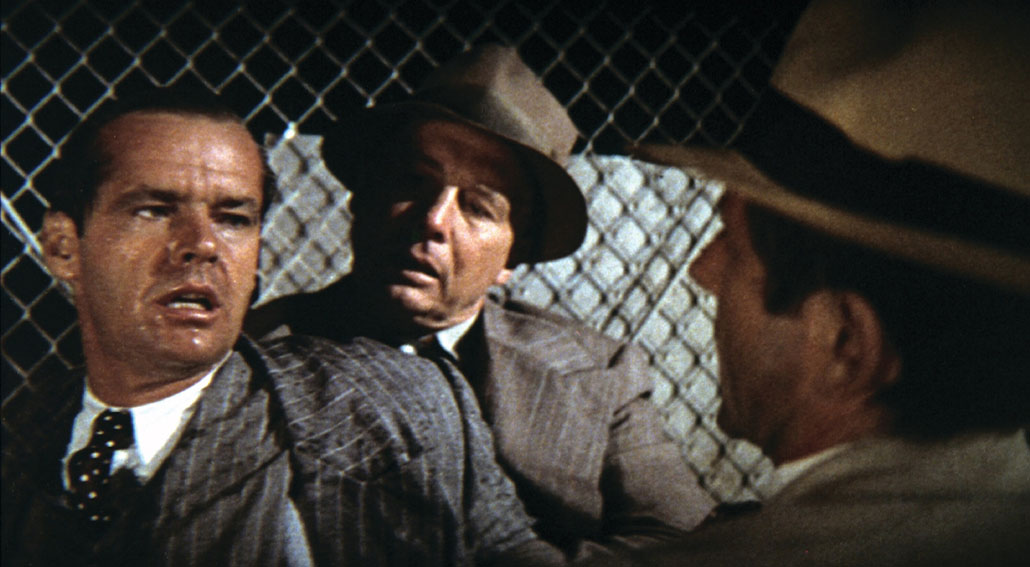by Darrin Navarro
I was only in my early 20s when I had decided that Roman Polanski and Robert Towne’s Chinatown was my favorite film of all time. As a kid, I had caught pieces of it on broadcast TV, and later was able to see the whole thing on cable. Eventually, it became the movie I could not turn off, even if I only happened upon it playing by chance.
In those days, I was enamored with it as an evocation of a mythologized Los Angeles, as well as an homage to a bygone genre that I recognized but didn’t yet know as well as I’d have liked to. At that age, I still maintained somewhat romanticized notions of LA, and it took me several viewings to really get my head around the intricacies of the plot and to sift through its layered themes of inherited fate.
By 1995, I had still not seen it on the big screen. That year, I was an assistant editor on William Friedkin’s Jade at Paramount Pictures, and while booking a screening, the scheduler let slip, “I can’t put you in the Paramount Theatre. Robert Towne’s going to be in there watching Chinatown.” She explained that Towne, the film’s screenwriter, was helping to ready the film for a Laserdisc release.
The next day, I told my editor, Augie Hess, that I wanted to try and watch the first few minutes of the Chinatown screening. Augie said, “Nothing’s happening here. Watch the whole damned thing if you want.”
Towne’s screenplay depicts 1930s LA as a city that will be plagued forever by the crimes of its conception, and offers an allegorical twin for the city in the innocent Kitty Mulwray, a child of incest, whom no one can protect from the criminal impulses of her father.
Honestly, I had only planned to watch it through the tiny square windows of the projection booth, but on his way in, Towne checked in at the booth to say hello. Slightly star-struck and taken with the moment, I piped up, “Mr. Towne, I’m a huge fan of your movie. Do you mind if I crash your screening?”
He smiled and waved me in. “Come on in!” he said. And so I did.
When the lights in the cavernous theatre dimmed and Jerry Goldsmith’s mournful main theme filled the room, it would not be enough to say that I was having a moment.
There is a great Hou Hsiao-hsien film from 1989 called A City of Sadness, which dramatizes the post-WWII massacres in Taiwan known as the “White Terror.” That title, though — A City of Sadness — could just as easily have fit this definitive, revivalist film noir.
In Chinatown, the city is Los Angeles, and the sadness is pervasive. Led by Jack Nicholson and Faye Dunaway, in what may be their most nuanced performances, the pre-war Angelinos in Chinatown are fearful, protective of secrets, and relentlessly pursued by their worst memories.
Towne’s screenplay depicts 1930s LA as a city that will be plagued forever by the crimes of its conception, and offers an allegorical twin for the city in the innocent Kitty Mulwray, a child of incest, whom no one can protect from the criminal impulses of her father, Noah Cross. Played with smug, growling menace by the great director John Huston, Cross is a personification of the greed and hubris that turned a desert into a city, supplied it with water stolen from the Owens Valley, and sold it off in parcels to cold, crowded East Coasters as shares of the American Dream.
Polanski, as a survivor of both the Holocaust and the Manson murders, and whose later sexual crimes remain notorious, was well acquainted with cyclical tragedy. Fittingly, under his direction, working with cinematographer John Alonzo, ASC and editor Sam O’Steen, Towne’s near-perfect screenplay became a masterwork of anxious cinema.
The print that Towne screened that day was faded and scratched, worse for wear, in fact, than Nicholson’s Jake Gittes after his encounter with Claude Mulvihill and a knife-wielding henchman (Polanski in cameo). None of this mattered much to me, though. At 28 years old, I had finally seen my favorite movie on the big screen, and I saw it in the flagship theatre at the studio where it had been made, as a rogue invitee of its legendary writer. And I was on the clock to boot.
My love for Chinatown has only deepened as my affection for LA has grown more complicated. I no longer buy the myth of Los Angeles as I probably did when I was a teenager making plans to move back here and start my career in the movies. Instead, I now regard the city with morbid fascination — in the same way that we crane our necks when passing some fatal wreck on one of our freeways.
As I have come to recognize that our city (love it as I do) is fundamentally dysfunctional in its politics, its planning and its very existence, the more I have come to regard Chinatown as essential in its fictionalized telling of LA’s history and the portentous implications of that history for our future.


